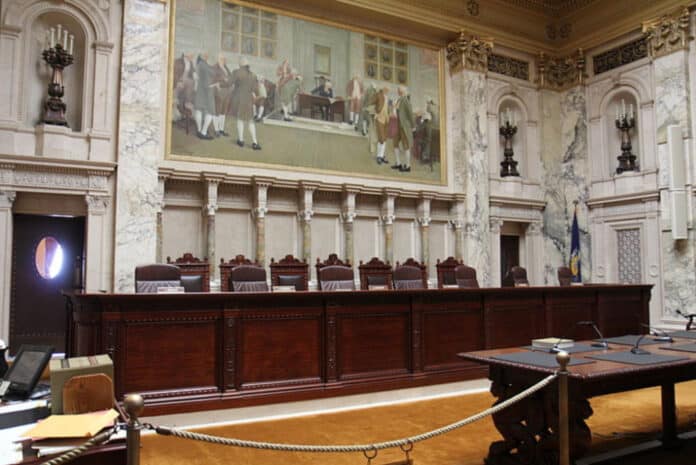What’s at stake? Everything.
A contested and extremely important state Supreme Court race is underway. Two conservatives (Jennifer Dorow and Dan Kelly) are facing two liberals (Janet Protasiewicz and Everett Mitchell) in the Feb. 21 primary. The top two vote-getters will advance to the April general election.
We can’t underscore enough how important this race is.
If either liberal wins, the left will seize outright control of the state Supreme Court. The consequences would be immense. Power has already been hanging in the balance of a single vote. As of June 2022, the Wisconsin Court had issued more 4-3 decisions “than at any time in the last 70 years.” according to WPR. If a liberal is elected in April, expect a lot of 5-2 decisions or 4-3 in the direction of the left.
A new liberal-controlled court would likely undo everything from Gov. Scott Walker’s signature reforms to the 1849 abortion law. A new liberal court would shift power to the governor and redraw the Legislature to Democrats’ favor. Gun rights, school choice, voter ID – it’s all on the line.
We have compiled the 12 top ways a liberal Supreme Court would destroy Wisconsin:
1. Legislative Maps
The leading liberal candidate for the court, Janet Protasiewicz, outright declared the legislative maps “rigged,” despite ethics codes barring judges from prejudging cases.
The Wisconsin Supreme Court (the liberals + sometimes conservative Justice Brian Hagedorn) initially approved Gov. Tony Evers’ legislative and congressional maps. The Evers’ maps were challenged at the U.S. Supreme Court. SCOTUS approved Evers’ Congressional map but remanded the legislative maps back to the Wisconsin Supreme Court because they failed a couple of key tests.
The Wisconsin Supreme Court had basically three options: fix the Evers’ maps to address the SCOTUS concerns; draw their own maps; or approve the GOP maps. They chose to approve the GOP maps in a 4-3 decision, with Hagedorn flipping to the conservative side.
A new liberal-controlled court would likely choose to draw its own maps, giving Democrats an advantage in the state Legislature, hoping to undo the Republican majorities. Those Republican majorities are the only thing stopping Evers’ agenda from running through Wisconsin like a freight train.
2. Abortion
Protasiewicz has been clear that she is pro-abortion and opposes the overturning of Roe V. Wade. A new liberal court would almost certainly strike down the state’s 1849 law banning abortion. In fact, Protasiewicz’s first TV ads focused on abortion.
“I believe in a woman’s freedom to make her own decision on abortion. It’s time for a change,” she says in one.
Democratic Attorney General Josh Kaul has already filed a suit to invalidate the 1849 law. Kaul is arguing the 1849 law is unenforceable because lawmakers passed other changes to abortion laws since then. They did so because Roe vs. Wade was in place then.
For example, Republican lawmakers banned abortions after five months of pregnancy. If the 1849 law is invalidated by the Wisconsin Supreme Court, Republicans almost certainly could not revise the law further because Evers would veto any changes.
Other than maps, abortion is the left’s top target.
3. Act 10
In 2011, Wisconsin passed Act 10, which limited the rights of public employee unions to demand collective bargaining. Act 10 did not restrict the rights of unions to represent their members. Public sector unions may not include health insurance costs, or larger benefit packages in their contracts. Act 10 limits salary raises to the consumer price index.
Last year, the MacIver Institute reported that Act 10 resulted in savings to school district budgets of $15 billion.
According to the Wisconsin Institute for Law & Liberty, Act 10 has allowed flexibility in the employment process for teachers. Now, good teachers can be rewarded with merit pay while bad teachers can be more easily removed.
Protasiewicz has already called Act 10 “unconstitutional,” telegraphing that a liberal court could seek to invalidate it. And you can bet that unions would bring a new case.
4. Election Integrity
Expect a liberal court to be extremely hostile to any efforts to tighten up election integrity.
In July, the Wisconsin Supreme Court, with Hagedorn joining the conservatives, ruled that “most ballot drop boxes aren’t allowed in the state and that a voter can’t have someone else return — in person — their completed absentee ballot on their behalf.”
Expect a liberal court to go in the other direction if it gets a new challenge, and it will.
“Zuckerbucks” and other election integrity issues could also end up before the court.
5. Concealed Carry
In 2011, Wisconsin passed Act 35 which allowed licensed people to carry concealed weapons in public. The law also allows for a person to carry, without a license, a concealed weapon in their home or place of business.
A liberal court would likely be hostile to the state’s concealed carry law. In 2022, the Wisconsin Supreme Court broadened the concealed carry law, saying that it people with disorderly conduct convictions couldn’t be invalidated from carrying concealed weapons.
6. Castle Doctrine
In 2011, Wisconsin enacted 2011 Wisconsin Act 94, known as the castle doctrine law.
According to the State Bar of Wisconsin, “the law affords a presumption of immunity in civil and criminal actions to individuals who use deadly force in self-defense against persons unlawfully or forcibly entering their home, motor vehicle, or place of business. It also prohibits consideration of whether the actor had an opportunity to flee or retreat before he or she used force.”
Expect the left to target this law.
7. Safer at Home Law
We doubt that lockdowns will ever be a realistic possibility again. The COVID-19 panic has waned. However, if such a situation ever presented itself, you can rest assured that a new liberal court would have kept the state locked down.
According to Wisconsin Public Radio, the Wisconsin Supreme Court ruled 4-3 that the “Evers’ administration exceeded its authority when state Department of Health Services Secretary Andrea Palm issued the ‘Safer at Home.'”
“This case is about the assertion of power by one unelected official, Andrea Palm, and her order to all people within Wisconsin to remain in their homes, not to travel, and to close all businesses that she declares are not ‘essential’ in Emergency Order 28,” conservative Chief Justice Patience Roggensack wrote for the majority.
A liberal court would likely have upheld these powers.
8. Right to Work
In 2015, Wisconsin passed 2015 Wisconsin Act 1 which created a “right-to-work” law for private sector employers and employees. Wisconsin “became the 25th state in the country to enact a ‘Right to Work’ law,” according to Quarles.com. “That law prohibits collective bargaining agreements from requiring an employee, as a condition of employment, to become or remain a union member or to pay any union dues, fees, assessments, charges, or other expenses to a union.”
It has had a lasting impact allowing employees to make their own union membership decisions across Wisconsin.
Multiple unions sued, arguing that “right-to-work” was “illegal taking of property without just compensation, prohibited under the Wisconsin constitution.”
A new liberal court would likely favor the unions if a new challenge was brought forward.
9. School Choice
Educational freedom, school choice, and parental rights will be at stake if the left seizes control of the state Supreme Court.
A Wisconsin Supreme Court decision upholding the constitutionality of vouchers dates to 2003. The Wisconsin Institute on Law and Liberty explains, “The Wisconsin Supreme Court held that the parent’s choice for the voucher, even if it is a religious private school, does not violate the Establishment Clause of the Wisconsin Constitution because the parent (not the government) is directing the dollars.”
Expect a liberal-controlled court to be hostile to educational freedom and school choice issues.
Expect a new liberal court to also neuter parents’ rights when it comes to school district gender policies. WILL sued to bar a Madison school district policy “that allows students to self-identify their names and pronouns without parental permission.” The state Supreme Court, with Hagedorn joining the liberals, had declined to rule on the underlying issue.
Another example: In 2019, the Wisconsin Institute for Law and Liberty wrote, “In Koschkee v. Taylor, we win again before the Wisconsin Supreme Court, establishing that educational policy in the state of Wisconsin is made by the legislature and not by the state Superintendent of Public Instruction.” A new liberal court would likely shift powers back to DPI in cases brought before it.
10. Voter ID
As NPR put it, “Wisconsin’s ID law has been the subject of litigation ever since it was passed by the state’s Republican-controlled Legislature in 2011.”
Liberals challenged its constitutionality. In 2014, the Wisconsin Supreme Court upheld the state’s photo ID law for voting. “Writing for the majorities in Milwaukee Branch of the NAACP v. Walker and League of Women Voters v. Walker, Justice Patience Roggensack ruled that Wisconsin’s Voter ID law was constitutional,” the Wisconsin Institute for Law and Liberty wrote.
A liberal court would probably strike the law down.
11. Restrict Police Powers
Expect a liberal-controlled court to restrict the powers of police at the detriment of public safety and police investigations. Expect them to expand the rights of criminal defendants.
These changes could come in the areas of search and seizure, lineups, interrogations, and more. For example, the court previously “held that a traffic stop may be based on a law enforcement official’s objectively reasonable mistake of law.” These kinds of cases would swing against cops.
In other cases, according to the Milwaukee Journal Sentinel, “a divided Wisconsin Supreme Court…threw out one conviction but upheld another in cases in which drivers challenged whether police officers’ really had probable cause for detaining them or were acting solely on hunches and bias over past drug use.”
In 2005, the state Supreme Court, in cases involving criminal defendants’ rights, started embracing a concept known as “new federalism.” This “refers to a tendency to look first to the state constitution and assign greater rights than the Supreme Court to parallel provisions in the federal constitution,” Wisconsin Appeals.net explained. Expect a comeback of that concept to grant criminal defendants more rights in Wisconsin than the U.S. Constitution requires.
12. The Governor’s Power
The Wisconsin Institute for Law and Liberty recently prevailed on a case limiting Evers’ veto authority. “We prevail in the state Supreme Court in Bartlett v. Evers, overturning certain of Governor Evers’ vetoes, ending the abusive veto that allowed governors to rewrite laws passed as part of the budget,” they wrote.
Expect a liberal court to expand Evers’ power.
Table of Contents







![Protecting Portland: No Good Deed Goes Unpunished [REVIEW]](https://www.wisconsinrightnow.com/wp-content/uploads/2025/07/portland-356x220.jpg)























